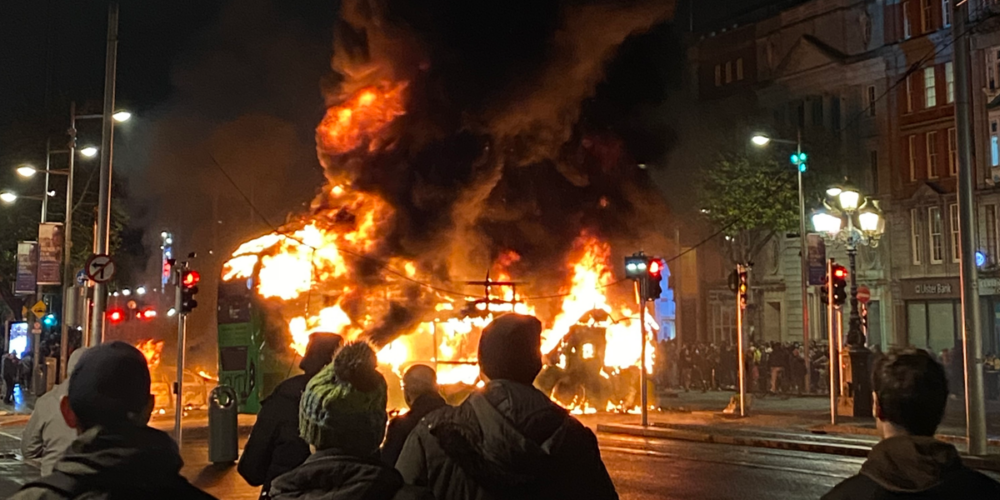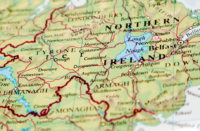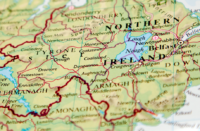In its recent statement, the Communist Party of Ireland condemned in the strongest possible manner the Dublin riots and extended its deepest sympathies and well wishes to the victims and families of the stabbing and the subsequent violence that erupted on the 23rd of November. However, the CPI also correctly understood the events as an inevitable outcome of a systematic and generational neglect of whole sections of Irish society, driven by capitalism and its class antagonisms.
There is no defending violence orchestrated against the community, against frontline and transport workers. The agenda of those taking part was pure opportunism, resulting in acts of hatred and violence. All that was needed was a veiled excuse, stirred up by an anti-immigrant agenda, using the dreadful stabbings earlier in the day provoking numbers to gather in town, to create an atmosphere ripe for a riot on the streets.
However, we need to understand the environment this violence emerged from, and the class system within which its material conditions are reproduced, in order to appreciate why the riot participants felt so intent on causing wanton destruction to the city.
Many rioters were still in their teenage years, and simply answered the calling signal of the fascist political rump willing to use them as cannon fodder. That these particular youths see engaging in such action as a point of pride amongst some of their peers, indicates clearly how the entire capitalist system has failed them. These are young people who feel totally alienated from society, from the system they are born into. In one sense they have an innate working class consciousness, but it is being hijacked and obscured into a false consciousness of violence and hate against a fictitious enemy.
Many have left or feel disconnected from the education system and are born into an environment defined by drugs, addiction, broken homes and criminal gangs, where often their peers are their support systems. Crime, violence and drugs are seen as a means to a living, a quick ticket to a bourgeois lifestyle, a vision often peddled by influencers and personalities who have benefited from this individualised, narcissistic worldview, promulgated by capitalism.
They do not see within the system a means of breaking the generational cycle of poverty. For them, to escape this existence, barbarism becomes their only option. If we condemn their actions, we must also condemn the environment, the society, the system, that reproduces them: the capitalist system where poverty and criminality thrive together. Furthermore, when we mock such people, we are mocking our own inability to organise within these communities.
If the disenfranchised teenage youth were the footsoldiers, fascist political figures were the officer corps, circulating demands on communication platforms to stoke up violence on the street, taking aim at government, but using immigrants as their main vehicle to spread hate. These figures certainly do not hold capitalism, the class-based system, to account, and have no real analysis of or solutions to class-based problems. All they offer are extreme views that polarise and weaken communities.
The stated issue of “immigration” points clearly to a failure on the part of the government: failure to create amenities, services, industry and jobs, educational facilities, housing and general infrastructure. People in working-class communities feel ostracized. The introduction of large numbers of asylum seekers and refugees into large-scale accommodation in these areas has provoked confusion and questions as to how the communities can support them.
It is on this point that the left have ceded ground to a right wing, racist narrative, which targets people of colour, whether refugees or asylum seekers, migrant workers or Irish-born, deliberately ignoring that migrants make a great contribution to Irish society, just as Irish emigrants have made in other countries. Migration is a complex issue which needs mature and honest debate on how Ireland can and should deal with people entering the country, with all stakeholders, not least the communities with which they would reside.
At the same time what must be recognised is the hypocrisy of Ireland, a supposed “neutral” state, when it comes to supporting the aggressive foreign policies of the imperialist blocs of the EU, UK and US (NATO), which have since the turn of the century, been in a state of continuous war, either direct or proxy, in different regions of the world. These wars, whether economic or military, have devastated and decimated nations and have forced vast swathes of people to migrate to what is seen as the relative safety of Europe.
Instead of pursuing a progressive neutrality and attempting to broker or promote peace agreements, Ireland and its foreign diplomats, in tow with EU allies, have been complicit in creating war refugees. The same political elite of this country has deprived and neglected working class communities for generations. Thus the far-right have been able to capitalise on genuine anger at continuous and systemic failed government policies. What we witnessed was a symptom of all of this playing out on the streets of the capital.
To sum up, of what has been a sobering affair for the Irish political landscape, where a section of the working class is becoming more extreme and influenced by the far right, a number of things have become very apparent:
- Systemic neglect, deprivation and poverty create environments where anti-social behaviour, criminal activity and lawlessness will thrive.
- That teenagers accustomed to this environment will perpetuate it with vigour.
- The far-right will exploit racial divisions within deprived communities to fulfill their own political interests, while sowing division amongst the working class.
- The far-right and criminal elements work hand-in-glove.
- Successive governments have failed working class communities.
- Passive neutrality brings with it a complicity to continuous imperialist war.
- The aggressive foreign policy of imperialist powers has created a refugee crisis, which has directly led to pressures in local communities around migration.
We cannot excuse, condone or ignore the actions of violence perpetrated by riotous elements on the streets of Dublin, but we can’t be ignorant to the underlying causes that give rise to a lumpenproletariat. As a class-conscious movement we need to stand for internationalism, for working class unity regardless of race, religion, or nationality, to unite against the barbarism being perpetrated against our communities and our class, and we will continue to denounce any such actions against all those who reside and seek shelter on these shores.






